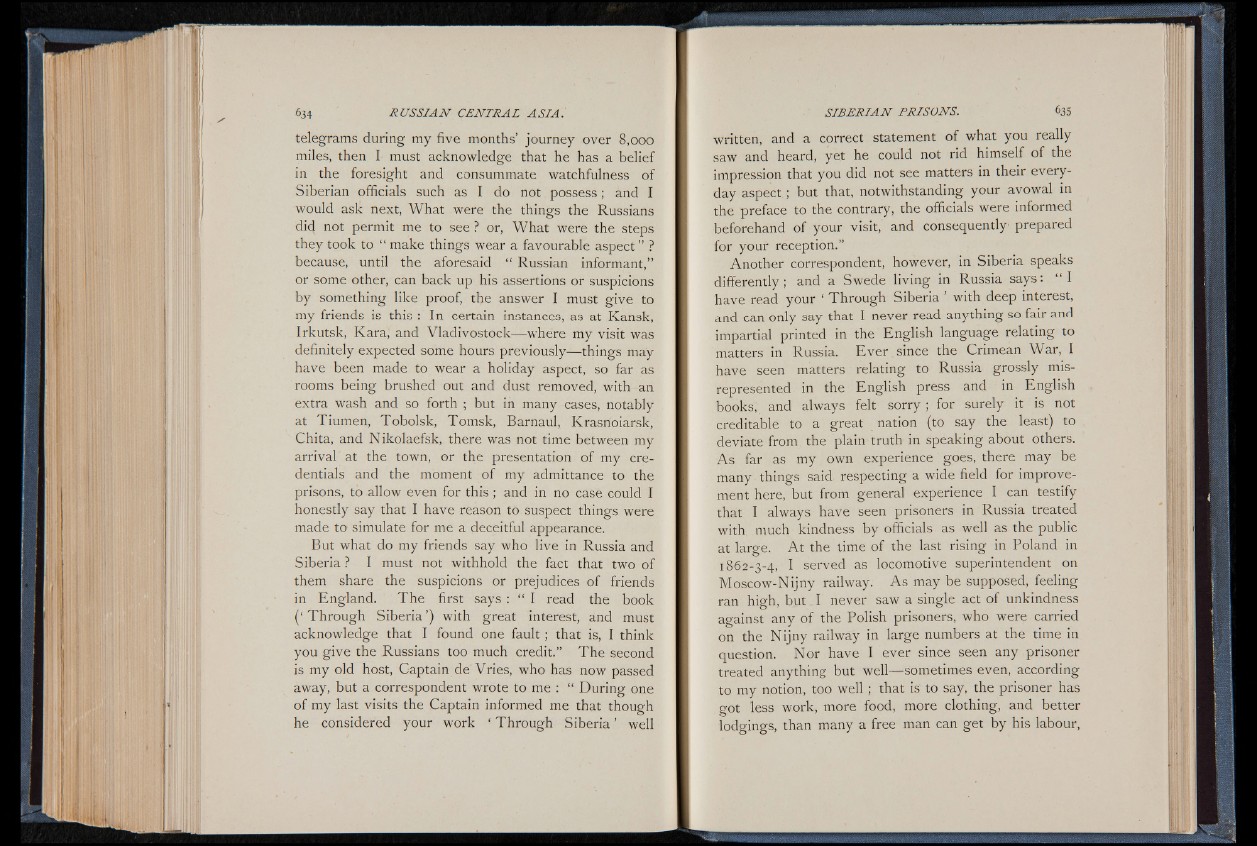
telegrams during my five months’ journey over 8,000
miles, then I must acknowledge that he has a belief
in the foresight and consummate watchfulness of
Siberian officials such as I do not possess; and I
would ask next, What were the things the Russians
di4 not permit me to see ? or, What were the steps
they took to “ make things wear a favourable aspect ” ?
because, until the aforesaid “ Russian informant,”
or some other, can back up his assertions or suspicions
by something like proof, the answer I must give to
my friends is this : In certain instances, as at Kansk,
Irkutsk, Kara, and Vladivostock— where my visit was
definitely expected some hours previously— things may
have been made to wear a holiday aspect, so far as
rooms being brushed out and dust removed, with an
extra wash and so forth ; but in many cases, notably
at Tiumen, Tobolsk, Tomsk, Barnaul, Krasrioiarsk,
Chita, and Nikolaefsk, there was not time between my
arrival at the town, or the presentation of my credentials
and the moment of my admittance to the
prisons, to allow even for th is ; and in no case could I
honestly say that I have reason to suspect things were
made to simulate for me a deceitful appearance.
But what do my friends say who live in Russia and
Siberia ? I must not withhold the fact that two of
them share the suspicions or prejudices of friends
in England. The first says : “ I read the book
(‘ Through Siberia ’) with great interest, and must
acknowledge that I found one fau lt; that is, I think
you give the Russians too much credit.” The second
is my old host, Captain de'Vries, who has now passed
away, but a correspondent wrote to me : “ During one
of my last visits the Captain informed me that though
he considered your work ‘ Through Siberia ’ well
written, and a correct statement of what you really
saw and heard, yet he could not rid himself of the
impression that you did not see matters in their everyday
aspect; but that, notwithstanding your avowal in
the preface to the contrary, the officials were informed
beforehand of your visit, and consequently- prepared
for your reception.”
Another correspondent, however, in Siberia speaks
differently; and a Swede living in Russia says: “ I
have read your ‘ Through Siberia ’ with deep interest,
and can only say that I never read anything so fair and
impartial printed in the English language relating to
matters in Russia. Ever since the Crimean War, I
have seen matters relating to Russia grossly misrepresented
in the English press and in English
books, and always felt so r ry ; for surely it is not
creditable to a great nation (to say the least) to
deviate from the plain truth in speaking about others.
As far as my own experience goes, there may be
many things said respecting a wide field for improvement
here, but from general experience I can testify
that I always have seen prisoners in Russia treated
with much kindness by officials as well as the public
at large. A t the time of the last rising in Poland in
1862-3-4, I served as locomotive superintendent on
Moscow-Nijny railway. As may be supposed, feeling
ran high, but I never saw a single act of unkindness
against any of the Polish prisoners, who were carried
on the Nijny railway in large numbers at the time in
question. Nor have I ever since seen any prisoner
treated anything but well— sometimes even, according
to my notion, too well ; that is to say, the prisoner has
got less work, more food, more clothing, and better
lodgings, than many a free man can get by his labour,